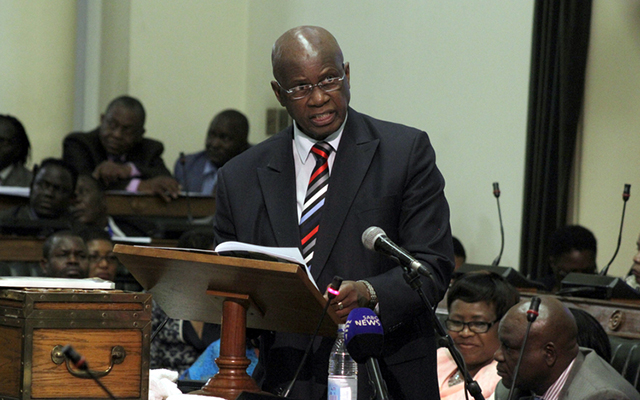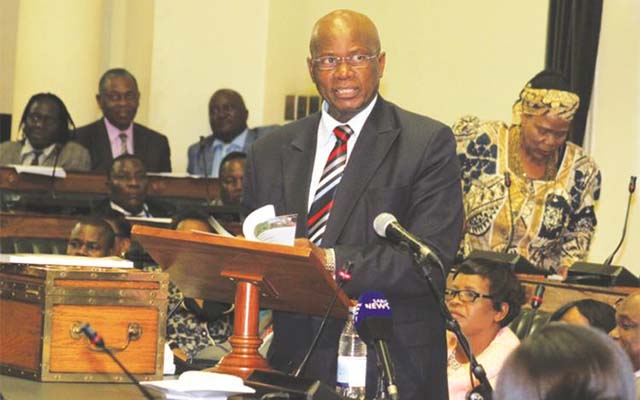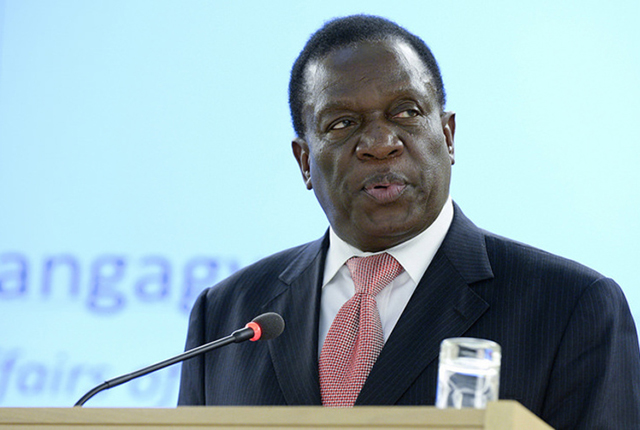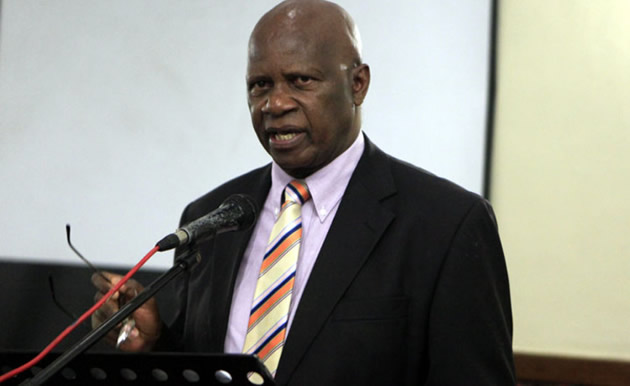Pro-recovery 2017 Budget tabled

Happiness Zengeni Business Editor—
Government plans to boost manufacturing industries and small businesses through pro-production interventions in the 2017 National Budget to instil investor confidence and spur economic recovery amid fiscal headwinds. It also sought to cushion the general public against the high cost of transactions on mobile banking by exempting companies from Value Added Tax and against unjustifiable increases in the cost of basic services after freezing prices and fees charged by public enterprises, including electricity, rates and water.
Finance and Economic Development Minister Patrick Chinamasa, in his 2017 National Budget proposals in Parliament yesterday, unveiled a raft of supply side interventions to enhance production across all sectors of the economy despite limited fiscal space.
The Budget was presented under the theme: “Pushing Production Frontiers Across All Sectors of the Economy”.
Minister Chinamasa acknowledged that Zimbabwe was in an unsustainable economic position characterised by low production, import dependency, low savings, low incomes, high formal unemployment as well as liquidity and cash challenges.
As a result, revenue collections have continued to shrink, with the 2016 position estimated to close at $3,52 billion from a mid-year revision of $3,69 billion. This is against $4,6 billion expenditures which included items which were outside vote appropriations initially made at the last Budget.
Some of the items relate to drought-related grain procurement, $253.5 million; Bonus payments for 2015, $177.8 million; December 2015 salary payment arrears, $138 million; and debt servicing amounting to $512.6 million.
For 2017, Minister Chinamasa said some of the spillover effects of the prevailing economic challenges will constrain revenue collection in the first part of the year. As a result, Government is projecting another budget imbalance for the next year, though much smaller, at $400 million from revenue collections of $3,7 billion and expenditures of $4,1 billion.
“This, therefore, reflects a (new) path towards reducing the budget imbalance through rationalisation and fiscal consolidation measures.
“Mr Speaker Sir, Government should move away from a situation where the perception and expectation that Treasury Bills have become a surrogate currency to meet expenditures and deficit financing,” Minister Chinamasa said. Government has been financing its deficit through the issuance of TBs now estimated at above $2,5 billion.
“The fundamental challenge remains that of under-production, entirely across all sectors of the economy. The major challenge for the 2017 National Budget is, therefore, taking the lead in ‘walking the talk’ with regards to implementing critical reforms.”
Some of the measures to support the stance taken by Government include removal of wheat flour, luggage ware (that includes bags and suitcases) and school uniforms from the Open General Import Licence. The Minister also proposed to amend bilateral rules of origin on flour, to the effect that the preferential treatment is granted to flour milled from wheat grown in the country for export
Treasury is set to increase customs duty on selected fabric, in order to level the playing field for the local industry. Clothing and furniture manufacturers will, however, continue to access fabrics duty free, under the clothing manufacturers rebate. Furthermore, it is proposed to avail additional raw materials under a rebate of duty on selected fabrics. This will provide a boost to the textile industry which is currently operating at between 30-35 percent.
In order to enhance its revenues, Minister Chinamasa will introduce a health fund levy of 5 cents for every dollar of airtime and mobile data. Resources raised would be channelled towards procurement of drugs and equipment for public health institutions.
The development themed ‘talk, surf and save a life’ was necessitated by the need to address overreliance on donor funding while increasing domestic funding for health.
“The continued reliance on a shrinking formal tax base to fund critical sectors such as health, is no longer sustainable, for both the taxpayer and Government. It is, therefore, critical that all economically active individuals contribute towards funding health services,” said Minister Chinamasa.
He said the shrinking tax base had also constrained Government’s capacity to invest in the public health delivery system, which was now being augmented with resources from development partners. The minister also introduced 40 percent excise duty on paraffin to stem illegal blending with diesel by fuel operators.
Further measures to boost revenues include the licencing of additional suppliers to supply fiscalised devices. “Currently, 10 companies are licenced to supply fiscalised devices, of which four are no longer operational. This has constrained the supply of fiscalised devices, thereby undermining progress of the programme.”
The minister also said Government will tighten existing legislative loopholes relating to the taxation of intangibles, general administration and management fees between associated companies, dividends arising from disallowed interest expenses and a permanent establishment.
Standard rating of meat products, rice, margarine and potatoes will be introduced while the debt redemption levy on petrol by 1 cent per litre, with effect from January 1, 2017. The minister also extended VAT zero rating to the supply of pipeline transportation, storage and handling services for purposes of delivery of fuel through the pipeline, with effect from January 1.
For small to medium enterprises, Minister Chinamasa said Government would eliminate double taxation on presumptive taxes payable under informal traders’ tax and make a downward review on the taxes.
“I have already identified inadequate working capital as one of the hindrances to the growth of SMEs. It is, therefore, proposed to ring fence revenue generated from presumptive taxes towards capitalisation of the Small and Medium Enterprises Development Corporation (SMEDCO) for on-lending to SMEs.”
Minister Chinamasa also said in order for efforts to formalise SMEs and enhance taxpayer compliance, particularly with regards to registration, filing of tax returns and payment of tax, the Zimbabwe Revenue Authority will intensify training programmes in collaboration with the responsible Ministry.
Government will introduce tax incentives for companies operating in Special Economic Zones. Under the proposed structure, companies investing in SEZs will be exempted from corporate income tax for the first five years of operation. Thereafter, a corporate tax rate of 15 percent applies.
There will be a Special Initial allowance on capital equipment to be allowed at the rate of 50 percent of cost from year one and 25 percent in the subsequent two years and Employees’ Tax Specialised expatriate staff will be taxed at a flat rate of 15 percent while raw materials inputs will be imported duty free.
Minister Chinamasa also extended the suspension of the export tax for another year to allow completion and migration to base metal refinery by December 2017. Minister Chinamasa said in the spirit of the agreed Social Contract already in place and launched by President Mugabe on February 26 2010, a general freeze on prices, fees and charges by all public sector entities will take effect from January 1 next year.
“Any increase in prices will have to be justified, and considered on its merits. This will include charges on water, power, rates, local taxes, environmental requirements,” he said. Minister Chinamasa projected the economy to grow 1,7 percent next year from the estimated 0.6 percent for 2016.










Comments